July 18 to July 24
Lukang’s (鹿港) once famous Shiyi Hall (十宜樓) stood deteriorating for years, a forgotten relic of a time during the mid-1800s when its builders, the Chen (陳) clan, were the wealthiest in town.
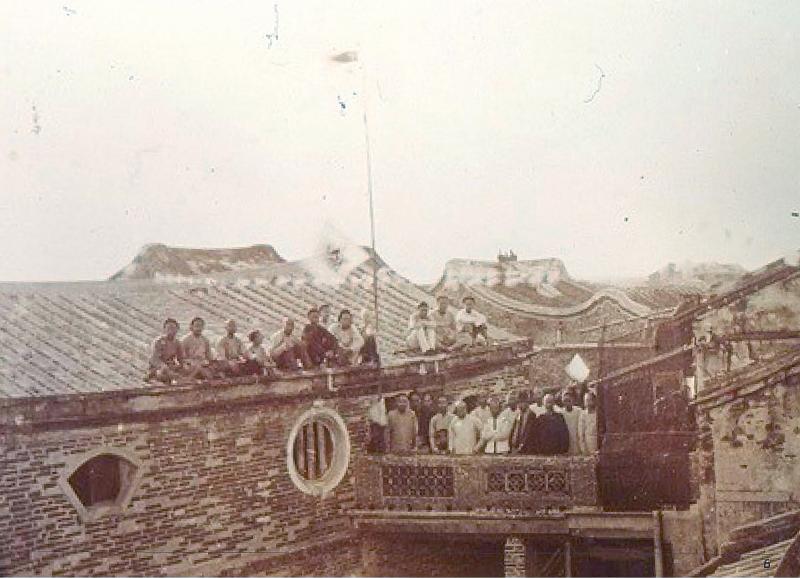
Photo courtesy of Changhua County Cultural Affairs Bureau
Despite the sharp decline in their business empire, the Chens remained prominent landlords in Lukang throughout Japanese colonial rule. The best-known member, Chen Huai-cheng (陳懷澄), served as the only Taiwanese mayor of the town for 12 years, and was an accomplished poet and founding member of the Lishe (櫟社) poetry society.
The family owed its prosperity to the Qingchang Hao (慶昌號) trading company, founded by Chen Ke-chin (陳克勤) who migrated from Fujian Province in 1805 and ran a fleet of junks across the perilous Taiwan Strait. Several local legends attribute Chen’s quick rise to his friendship with notorious pirate Tsai Chien (蔡牽), who terrorized the waters and parts of Taiwan until his death in 1809.
Shiyi Hall was a gathering place for intellectuals and artists, and lore has it that the building’s literal name (“10 suitables”) draws from the fact that it was a suitable place for 10 activities: music, chess, poetry, wine-drinking, painting, flower appreciation, moon gazing, gambling, smoking and tea-drinking. Its second floor connecting bridge also formed a “10” shape with the alley below.
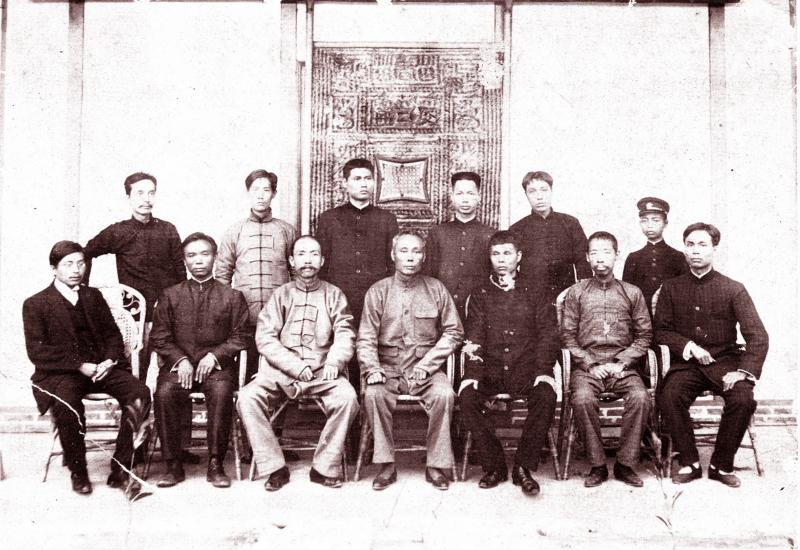
Photo courtesy of Taichung City Government
Due to a business failure, Chen Chih-fen (陳質芬), a grandson of Chen Ke-chuan, sold Shiyi Hall to local businessman Chuang Tsai-tian (莊再添) in 1929. Chen Chih-fen’s son later married Chuang’s daughter.
The building went through several renovations over the decades, but it was damaged by the 921 Earthquake of 1999 and Typhoon Megi in 2016. Restoration efforts began two years ago and were completed last week, and the former private residence is now open to the public for the first time.
FOUNDING FATHER
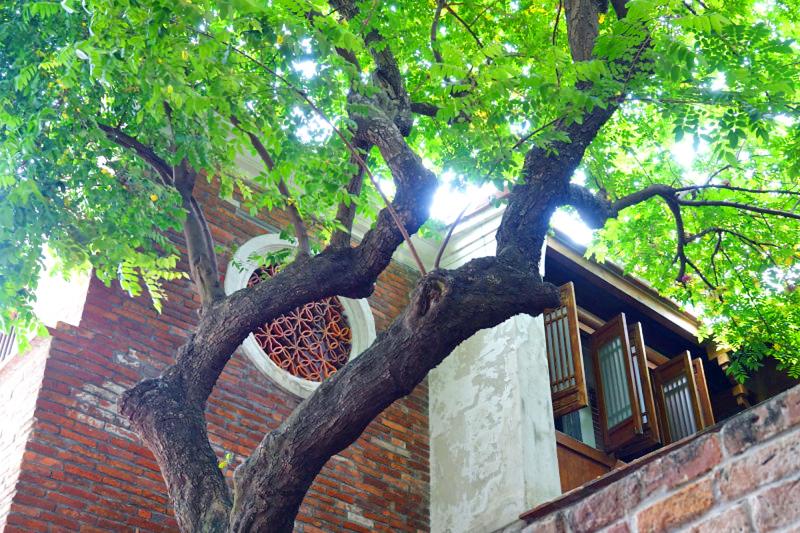
Photo: Liu Hsiao-hsin, Taipei Times
There is little information on Chen Ke-chuan’s early life, except that he arrived in Taiwan at the age of 30 and likely started out as a chef for a trading company. Lee Chao-jung (李昭容) records in her book on the family three legends about his involvement with Tsai, who appeared as a disheveled old man. Having no idea that Tsai was an important figure in the company, Chen impressed Tsai and was promoted to store manager. He later took over the business, which became Qingchang Hao.
In another tale, a despondent Tsai was on the run from the authorities in Lukang when he came across Chen, who offered him food. In return, Tsai gave him a yellow flag that guaranteed him safe voyage across the strait, prompting him to launch Qingchang Hao.
There are actually many similar legends across Taiwan involving Tsai, and Lee posits that these stories were a way to sugarcoat the fact that many merchants simply paid tribute to Tsai for protection on the seas.
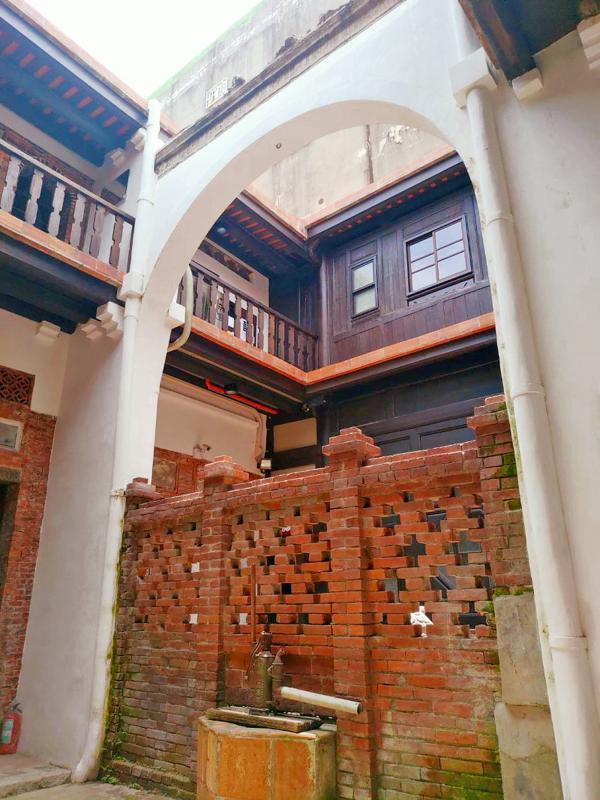
Photo: Liu Hsiao-hsin, Taipei Times
Qingchang Hao became the leading business in Xiajiao (廈郊), the second most powerful of the eight merchant guilds in Lukang. The largest was Quanjiao (泉郊), led by the company Rimao Hang (日茂行).
Chen was revered in the region for his philanthropy and ability to resolve conflict. He also gained status with the Qing Dynasty through paying tribute, including donating rice in 1821 to relieve a famine in Tianjin.
Chen attained sixth-grade ranked official status in 1833 after helping quell a local uprising, and in 1837 he was one of the main mediators in an internal financial dispute within Rimao Hang, indicating his clout. By 1845, he had been promoted to fifth grade, and Qingchang had overtaken Rimao Hang as the top business in Lukang.
UNREST AND DECLINE
When Chen died in 1861, his seven sons carried on the family business and continued helping the government handle local conflicts. His second son, Chen Tsung-huang (陳宗潢), was also a sixth-grade ranked official, and in 1846 became the first person from Lukang since 1825 to pass the imperial examinations.
The Tai Chao-chun (戴潮春) rebellion broke out in 1862, and Chen Tsung-huang’s son Chen Yao (陳耀) led the family’s defense of Lukang along with other prominent local clans. He was revered for his bravery and fighting skills, and likely died in battle.
During this time, Chen Ke-chuan’s family in Fujian requested his body to be sent back. The Taiwanese relatives were hesitant, as Tai’s uprising was still raging in central Taiwan while the Taiping rebels had overrun much of the Fujian coast.
Chen Ke-chuan’s seventh son, Chen Tsung-hua (陳宗華), was the only one who volunteered for the perilous task. Lee writes that most people in Chen’s home village had fled, but Chen Tsung-hua and his wife insisted on staying to complete the three-year mourning tradition. They tried to return to Taiwan in 1865 but were blown back by a storm, and finally made it home the following year.
The Chen family had spent a fortune fighting Tai, fronting much of the costs that the other clans reportedly never paid back after Chen Yao’s death. Their prestige quickly declined, and although they lived comfortably as landowners, they were largely absent from public affairs until the end of the Qing Dynasty.
POETS AND OFFICIALS
The merchant guild system collapsed under the Japanese, although the Qingchang name remained a spiritual symbol to the family.
Chen Huai-chen formed Changhua’s first poetry society in 1897, and in 1902 cofounded Lishe with eight other Taichung intellectuals, including several members of the Wufeng Lin family (霧峰林家). Lishe was one of the three main poetry societies during the Japanese era, and was known for its critical tone. As mayor, he improved the town’s sanitation, reduced begging, encouraged elites to donate to charity and built the local library and public hall.
Even though Shiyi Hall was divided between three branches of the family, Chen Huai-chen’s cousin Chen Chih-fen lived in it and became the sole owner in 1916. Chen Chih-fen served as a district official, co-founded Changhua Bank and was also a poet. Although the cousins worked closely with the Japanese, their writings lamented foreign rule and made efforts to safeguard Han Taiwanese rights and culture.
Most of the Chen clan left Lukang after World War II, except for Chen Huai-cheng’s son Chen Pei-hsu (陳培煦), who was elected to two terms as Lukang mayor. None of his children chose to stay in Lukang, but the Chen family kept their ties to their hometown, especially by preserving local history.
Taiwan in Time, a column about Taiwan’s history that is published every Sunday, spotlights important or interesting events around the nation that either have anniversaries this week or are tied to current events.

“Why does Taiwan identity decline?”a group of researchers lead by University of Nevada political scientist Austin Wang (王宏恩) asked in a recent paper. After all, it is not difficult to explain the rise in Taiwanese identity after the early 1990s. But no model predicted its decline during the 2016-2018 period, they say. After testing various alternative explanations, Wang et al argue that the fall-off in Taiwanese identity during that period is related to voter hedging based on the performance of the Democratic Progressive Party (DPP). Since the DPP is perceived as the guardian of Taiwan identity, when it performs well,

The Taiwan People’s Party (TPP) on May 18 held a rally in Taichung to mark the anniversary of President William Lai’s (賴清德) inauguration on May 20. The title of the rally could be loosely translated to “May 18 recall fraudulent goods” (518退貨ㄌㄨㄚˋ!). Unlike in English, where the terms are the same, “recall” (退貨) in this context refers to product recalls due to damaged, defective or fraudulent merchandise, not the political recalls (罷免) currently dominating the headlines. I attended the rally to determine if the impression was correct that the TPP under party Chairman Huang Kuo-Chang (黃國昌) had little of a

At Computex 2025, Nvidia CEO Jensen Huang (黃仁勳) urged the government to subsidize AI. “All schools in Taiwan must integrate AI into their curricula,” he declared. A few months earlier, he said, “If I were a student today, I’d immediately start using tools like ChatGPT, Gemini Pro and Grok to learn, write and accelerate my thinking.” Huang sees the AI-bullet train leaving the station. And as one of its drivers, he’s worried about youth not getting on board — bad for their careers, and bad for his workforce. As a semiconductor supply-chain powerhouse and AI hub wannabe, Taiwan is seeing
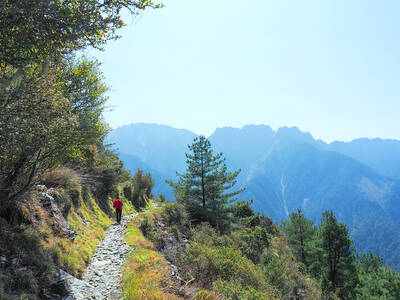
Jade Mountain (玉山) — Taiwan’s highest peak — is the ultimate goal for those attempting a through-hike of the Mountains to Sea National Greenway (山海圳國家綠道), and that’s precisely where we’re headed in this final installment of a quartet of articles covering the Greenway. Picking up the trail at the Tsou tribal villages of Dabang and Tefuye, it’s worth stocking up on provisions before setting off, since — aside from the scant offerings available on the mountain’s Dongpu Lodge (東埔山莊) and Paiyun Lodge’s (排雲山莊) meal service — there’s nowhere to get food from here on out. TEFUYE HISTORIC TRAIL The journey recommences with